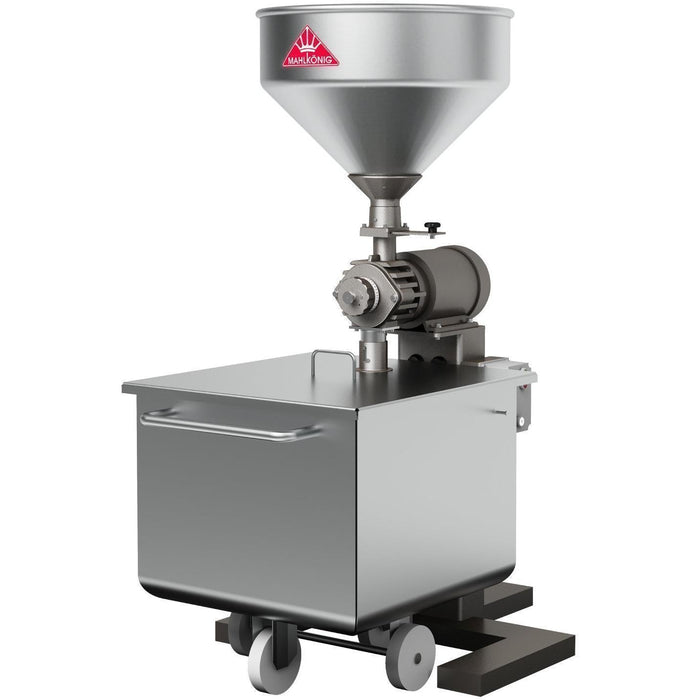Industrial Coffee Grinder: Top Features to Consider Before Purchasing
Industrial Coffee Grinder: Top Features to Consider Before Purchasing
Blog Article
Industrial Coffee Grinder Guide: Boost Efficiency and High Quality
In the affordable landscape of coffee production, picking the appropriate commercial coffee grinder plays a crucial function in enhancing both effectiveness and product top quality. Recognizing the nuances of various mill kinds and essential attributes-- such as customizable work setups and durable construction-- can substantially affect the last flavor profile of the coffee. The optimization of the grinding process, paired with attentive maintenance, is crucial for maintaining performance over time. As we discover these important aspects, it ends up being noticeable that the effects prolong beyond simple tools selection, affecting overall service success in ways that warrant closer evaluation.
Comprehending Mill Types
When picking an industrial coffee mill, comprehending the various kinds readily available is important for optimizing both taste extraction and operational performance. The 2 main kinds of mills are blade mills and burr mills.

Inevitably, picking the ideal kind of grinder is important to maintaining quality and performance in coffee production, making it important for services to buy high-grade burr grinders for ideal outcomes.
Trick Functions to Think About
Selecting a commercial coffee mill calls for careful factor to consider of several vital features that can significantly affect both performance and the total coffee experience. One of the primary elements to examine is the grinding mechanism. Burr mills are typically preferred over blade mills, as they provide a regular grind dimension, which is crucial for optimal extraction and taste.
An additional crucial function is the grinder's capability. Depending upon the quantity of coffee you need to procedure, select a model that can manage your requirements without compromising speed or top quality. Furthermore, consider the grind setups provided. A versatile grinder with several setups permits you to customize the grind dimension to different brewing approaches, improving the coffee's flavor profile.
Assess the grinder's noise level, specifically in an active café or manufacturing setting, where extreme sound can be turbulent. Spending in a grinder that balances these features can significantly boost both functional efficiency and the top quality of the coffee offered.
Optimizing Grinding Refine
To accomplish the best results in coffee preparation, optimizing the grinding process is necessary. The grind size substantially affects removal, flavor, and total quality of the brewed coffee.


Furthermore, monitoring the grinding rate can optimize the process. Slower grinding typically creates much less warmth, protecting fragile flavors and scents. On the other hand, faster grinding may produce excessive heat, negatively affecting the coffee's quality.
Upkeep and Treatment Tips
Correct upkeep and treatment of industrial coffee mills are essential for making certain optimum performance and durability. Normal cleaning is the structure of upkeep; deposit buildup can influence flavor and grinding efficiency. It is recommended to clean the grinder after each use, wiping down the outside and eliminating any type of coffee premises from the burrs.
Additionally, check the grinding burrs for deterioration. Plain burrs can compromise grind consistency, so they need to be replaced as required. Industrial Coffee Grinder. Occasionally adjusting the grinder is also critical, as this preserves the desired work size for numerous developing methods
Lubrication of moving parts need to be done according to the supplier's requirements, as this reduces friction and extends the life of the devices. It is vital to utilize food-grade lubes to make certain safety and compliance with wellness guidelines.
Lastly, keep the grinder in a secure and completely dry atmosphere to stop corrosion and corrosion. By adhering to these upkeep and care tips, operators can boost the effectiveness of their industrial coffee mills while ensuring premium result and extended functional life.
Roi Evaluation
Evaluating the roi (ROI) for commercial coffee grinders is vital for businesses looking for to optimize their coffee production capabilities. A detailed ROI evaluation aids identify the monetary feasibility of purchasing high-grade grinders, enabling companies to weigh the initial expenses versus possible official site gains.
To conduct an extensive ROI evaluation, services need to consider numerous crucial factors. First, examine the purchase cost of the grinder, including installation and any required alterations to existing infrastructure. Next, calculate operational costs, including power consumption, upkeep expenses, and labor efficiency improvements. High-performance grinders commonly result in minimized grinding time and boosted throughput, which can significantly boost productivity.
In addition, think about the influence on item quality. Industrial Coffee Grinder. Superior mills produce an even more constant grind dimension, which can enhance flavor accounts and next page client complete satisfaction, inevitably driving sales. By increasing the high quality of the end product, companies can validate higher rates, leading to raised earnings
Verdict
In summary, an industrial coffee grinder plays a crucial function in boosting both effectiveness and product quality within coffee manufacturing. By choosing high-quality burr grinders equipped with necessary attributes such as adjustable grind setups and resilient building, services can ensure ideal taste extraction. Furthermore, regular upkeep is vital for maintaining grinder performance and making best use of customer fulfillment. Eventually, the tactical investment in a reputable mill contributes substantially to boosted earnings and competitiveness in the coffee sector.
In the affordable landscape of coffee production, selecting the right industrial coffee grinder plays a pivotal duty in boosting both performance and product high quality. The 2 key kinds of mills are blade grinders and burr mills. Within the burr mill classification, there are flat burr grinders additional reading and conical burr mills, each with its benefits. Burr grinders are generally preferred over blade mills, as they supply a consistent work dimension, which is vital for ideal extraction and taste.
In summary, a commercial coffee mill plays a critical role in boosting both effectiveness and product high quality within coffee production.
Report this page